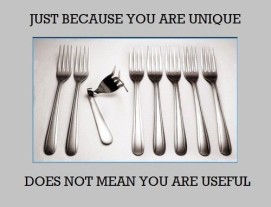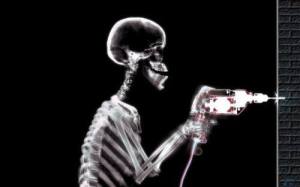Probably Western Australia’s greatest company, the conglomerate Wesfarmers, used to (maybe still do) have a rule: ‘no hubris’. Some credit the company’s considerable success to overtly challenging excessive self pride and leadership by ego. The company has built an impressive reputation for teamwork and innovation as a consequence. Skyhooks, the 70’s Aussie social observers, in their song: ‘Ego is not a dirty word’ satirically comment on the importance of ego. I suspect their commentary was a result of the suppression of individuality at the time and the promotion of their own eccentricity. It did however foreshadow the excess of ego thirty years hence. ‘…..If I did not have an ego I might not think that I was right’
Linking the previous post on coolness to the ‘cult of me’, is the lyrics from Alice Cooper, from the song, I’m the Coolest:
‘You know that I’m the coolest
That’s ever come around
You’ll notice things get hotter
Whenever I’m in the town
I mean I gotta be the coolest
Who else could it be
Everybody knows who’s really cool…
….Me!’
 I believe the focus on self is growing and this is principally underpinned by the internet and social media. For the record, I am aware of the irony in commentating via this medium.
I believe the focus on self is growing and this is principally underpinned by the internet and social media. For the record, I am aware of the irony in commentating via this medium.
Through the net, everyone can have a personal promotion platform. They can get instant world-wide circulation and feedback. Projection of the ‘self’ can also be done through the veneer of a mask- all can be transacted without direct personal contact and the use of veils. The narcissist is able to dwell on their favourite subject through a range of personas.
I am not the little boy in the front of the dyke with a wet finger. Attempts to stem the tide are not possible or indeed desirable. History is littered with the failure of censorship in all its forms. I am an unabashed supporter of freedom of both access to information and expression. Discussing the secondary consequences of unprecedented incoming and outgoing information is however important, even if ready made solutions are not possible.
Furthermore, there are real very risks in presumptions across generations- shorthand can oh so quickly lead to debilitating prejudice. I am suspicious of the motives and accuracy of the ‘generation commentators’, particularly gormless marketing men in suits trying to sell to manufactured markets in order to further their own agendas. Finally, I am wary of the validity and consequence of established generations judging the emergent. A ‘lived experience’ is always superior to armchair analysis. Hindsight is full of blind spots.
With these caveats, I think it is useful to explore tomorrow’s future leaders on the basis of searching for possible consequences.
 Hugh McKay, Australia’s wonderfully incisive social commentator (the furthermost from the faceless and fatuous marketers) outlines some of the features of Generation Z. They were born after 1995 and are known as Digital Natives. They are used to instant action and satisfaction due to internet technology. They have never known a life without the internet, computers and mobile phones. Their means of communication is mainly through online communities and social media like Google, MySpace, Twitter and Face Book, rather than personally meeting their friends and developing relationships. They are capable of belonging to huge communities and have massive collaborations using the Internet without knowing anyone personally.
Hugh McKay, Australia’s wonderfully incisive social commentator (the furthermost from the faceless and fatuous marketers) outlines some of the features of Generation Z. They were born after 1995 and are known as Digital Natives. They are used to instant action and satisfaction due to internet technology. They have never known a life without the internet, computers and mobile phones. Their means of communication is mainly through online communities and social media like Google, MySpace, Twitter and Face Book, rather than personally meeting their friends and developing relationships. They are capable of belonging to huge communities and have massive collaborations using the Internet without knowing anyone personally.
Like all generations, Gen Z pursues individuality. The difference and challenge lies in the environment they do so. The internet and social media have inherent risks of promoting homogeneity and dumbing down thinking. This may appear counter intuitive- surely with the unprecedented scale of choice currently offered, there will be commensurate individualisation? I would argue that in there are strong forces against. The immediacy reflected in the medium and the nature of Gen Z’s, pressures conformity. The vaunted ‘wisdom of crowds’ can quickly become the power to submit- cyber bullying is an example of this phenomena afflicting this generation. This power is amplified due to a) the ‘impressionable’ age of this generation- this is true of all generations of this age; and b) and it’s very characteristics i.e. McKay’s ‘dearth of personal relationships’ results in less and poorer quality reference, and subsequent reflection- aka the ‘dumbing down’.
 So if this is the consequence, what is the cure? First of all, I believe it unwise to propose one- see previous comments on inferences across generations. The best I can do is drill down into alternate role models. Two present in the current media:
So if this is the consequence, what is the cure? First of all, I believe it unwise to propose one- see previous comments on inferences across generations. The best I can do is drill down into alternate role models. Two present in the current media:
A. Victoria Cross recipient Ben Roberts-Smith leaving Army for career in business
After 17 years of service the Corporal Roberts-Smith will head back to university to undertake business studies. Australia’s most decorated modern soldier who also received a Medal for Gallantry for extreme heroism under fire, will continue to serve in the Army Reserve, the Australian Defence Force says.
“It has been a great honour to serve my country for the last 17 years,” he said in a statement. “I have been extremely privileged to serve alongside some of the best men and women in Australia.”
He was awarded the Victoria Cross for Australia in 2011 for his role in assaulting enemy machine gun positions in Afghanistan while the rest of his squad was pinned down. Corporal Roberts-Smith, donated his medal to the Australian War Memorial. In all the communications he only mentions the contribution and benefits of others.
Wesfarmers would be well served to see him about an engagement as he epitomises ‘no hubris’. Or as the incredibly successful Paul Roos’ (past coach of the Sydney Swans FC) recruitment policy- ‘No dickheads’.
The second example is a curious one. It contrasts Corporal Robert-Smith consistent track record of service above self.
Pope Francis’ Reforms
The Catholic Church put Gen Z in the shade for institutional pompous posturing, perpetual pathology and narcissism- they have passed laws and committed crimes under the umbrella ‘it is all about me’. How refreshing it is to read in the mornings press that the new pope is ‘showing increased determination to overhaul the Vatican-centric and narcissistic Catholic Church.’ he has attacked the ‘courtier culture’ and likened it  to leprosy. He says: ‘Leaders of the church have often been narcissuses, gratified and sickeningly excited by their courtiers. I do not share this vision and will do everything to change it.’ Wow!
to leprosy. He says: ‘Leaders of the church have often been narcissuses, gratified and sickeningly excited by their courtiers. I do not share this vision and will do everything to change it.’ Wow!
Watch this space. This ranks as the greatest battle of its kind going around. Without being too ecclesiastic, this looks to be the nearest thing we will get to the classic good versus evil war. I would contend that ‘evil’ has a lot to do with the self and ‘good’ has a lot to do with the community. What a bittersweet irony that it is being waged within the church. Whilst it is internal, the lessons are immensely applicable more broadly. This includes to Gen Z’s, as I expect the internet will be the courier of dispatches and Papal Bulls of yesteryear.
I would suggest the Pope have trusted friends test the wine and wafers.
He could do well to contact Corporal Robert-Smith for aid. Expect a lot of blue on green action.
KG

Interesting concept. The self is definitely a more accessible concept nowadays, what it means for future generations will be played out in the public eye regardless so we’ll be able to watch it unfold.
This link is on a similar vein in relation to aspirations of gen y – http://www.waitbutwhy.com/2013/09/why-generation-y-yuppies-are-unhappy.html and their understanding of what they need to achieve to be happy with themselves so its worth a read.